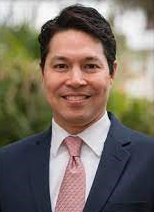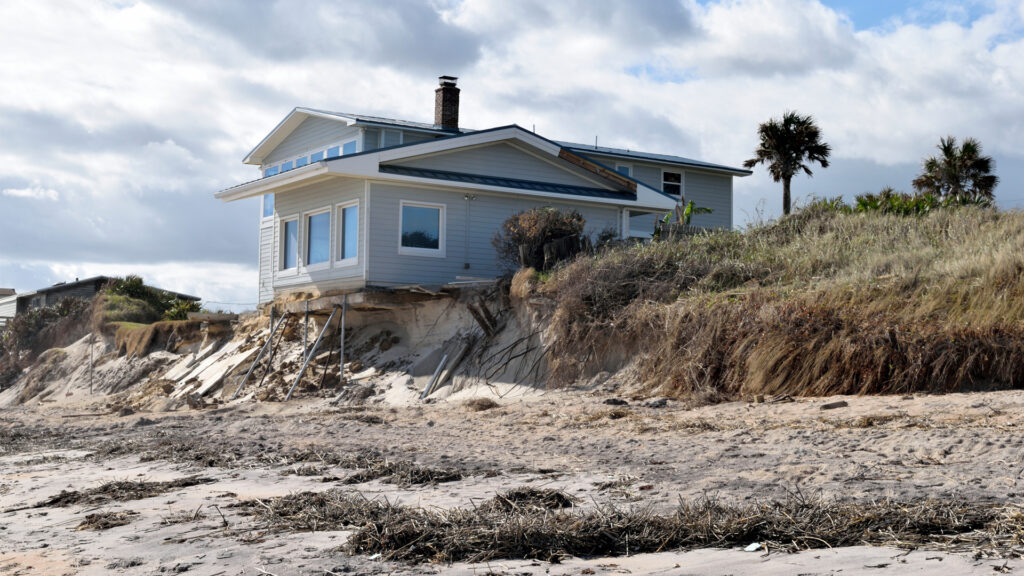By Paris Santiago, FAU Center for Environmental Studies
The following is a Q&A conducted with Stephen “Pepper” Uchino, president of the Florida Shore and Beach Preservation Association (FSBPA) since 2019. FSBPA provides information to lawmakers on beach preservation issues and funding, while promoting effective beach management and addressing beach erosion. This interview has been edited for length and clarity.
What motivated you to work on climate issues in the first place?

For me, it started with my mom’s involvement in environmental issues in Connecticut, where I grew up. If I can recall correctly, she was on the Connecticut Council for Environmental Quality. The climate change (interest) specifically started for me after college. I graduated from University of Miami with a marketing degree and worked a little bit in the field, and then realized that I needed to get back to a center for me for where my passions lay.
It was the early 2000s after college, and you couldn’t avoid the discussions about climate change and how impactful they were going to be for Florida. … I really honed in on the impacts that climate was going to have on the state. In the reevaluation of what I wanted to do, I decided environmental policy and law.
I went and got a master’s and a law degree from University of Miami where I focused on Everglades restoration. I never left that center of how climate change and changes in in the environment were affecting both the natural and the built environment in Florida.
So, jumping forward to today, how does your current position impact these issues?
I was the staff attorney for the Environmental Preservation and Conservation Committee for the Florida Senate. I did that for three or four legislative sessions. And then, I was appointed to staff director of the same committee. So, I’ve been involved in literal policy development for the state of Florida since that time, which was in 2009.
Then I joined a consulting firm that was known as “the water guys” – it’s called Anfield Consulting Group – and continued my focus on environmental issues. Now, I’m the president of the Florida Shore and Beach Preservation Association.

There is no state in the country that is more on the front lines of climate change than the state of Florida and specifically, our beaches. Our beaches really are taking the brunt of sea-level rise, increasing storm intensity and frequency, etc.
My work with FSBPA is integrally tied to the change in climate and how to adapt and mitigate for the effects of climate change. Now, we can mitigate for the impacts of it, and hopefully slow down the change, but being able to hold the line or to reverse the line on climate change is no longer a reality. We’re past that point.
When I was with the Anfield Consulting Group … some of our partners and stakeholders created a nonprofit called Resiliency Florida, which was all about how we could future-proof Florida and become more resilient. Fast forward to now with my work with FSBPA and the ability to work with protecting our beaches, I reintegrated with Resiliency Florida and we have launched a conference that integrates beaches with … the center part of the state.
I think a lot of times what happens is we talk about the coastal areas, or we talk about the inland areas and sometimes there’s disconnects, so the whole point of this new conference that we’re launching called the Florida Resilience Conference is to more holistically address the impacts that Florida is experiencing from spine to coast.
What is the most effective measure you think the whole state of Florida could take to address climate change?
I think Florida, in terms of the policy arena, should be leading the charge and trying to maintain reductions in carbon emissions. There’s no state in the nation that is going to be more affected by sea-level rise than the state of Florida. We probably have trillions of dollars of public and private infrastructure at risk along the coast; the vast majority of people in Florida live along the coast. We should definitely be a leader.
I don’t know if you’ve seen the sea-level rise curves, the low/minor/moderate/medium/high/etc. The highest level curves are if we do nothing and continue on this path, right? Well, we’re already seeing that policies are shifting and that we’re starting to try to decarbonize energy and different types of infrastructure.
Florida really should take a lead on that, through public and private partnership to keep the curves low. The lower that curve goes, the less impact there is going to be from sea-level rise.
Right, so kind of looking at a more positive side of things: I know this can be like a very doom-and-gloom topic, but is there something positive that you see being done about climate change that might be going unnoticed?
Yeah, I do. I mean, part and parcel to the Resilience Conference is the sheer amount of money and policy effort that has shifted in Florida over the last three to four years.
There was a rumor during the previous administration that administration agency officials couldn’t say “climate change.” That actually came to a head in the Florida Senate while I was there in one of the committees, there’s a record of it. That has completely dissipated. That is no longer even close to the reality, and I think that (the issue) has been embraced by both parties and has become a nonpartisan issue in Florida.
You can see that the Legislature here, in terms of the policymaking, has put vast amounts of money toward resilience and vast amount of effort and hours to develop the policy that goes along with the funding. In terms of just the general public, they might not see those efforts. Those efforts are just at their infancy right now.
Even though the money is there, we’ve just completed that every single county will have a vulnerability assessment now. If they haven’t already, it’ll be happening (in the) very near future. It will be the roadmap on how we can address climate-change impacts moving forward, and how to spend money wisely. That’s probably hidden from most people in the public, but that stuff is all going on behind the scenes.
This Q&A was conducted by Paris Santiago, a graduate research assistant at Florida Atlantic University who is pursuing a master’s degree in the environmental science program. She has worked as a research assistant for FAU’s Center for Environmental Studies since 2022. The center manages and funds The Invading Sea.
Sign up for The Invading Sea newsletter by visiting here. If you are interested in submitting an opinion piece to The Invading Sea, email Editor Nathan Crabbe at nc*****@*au.edu.



